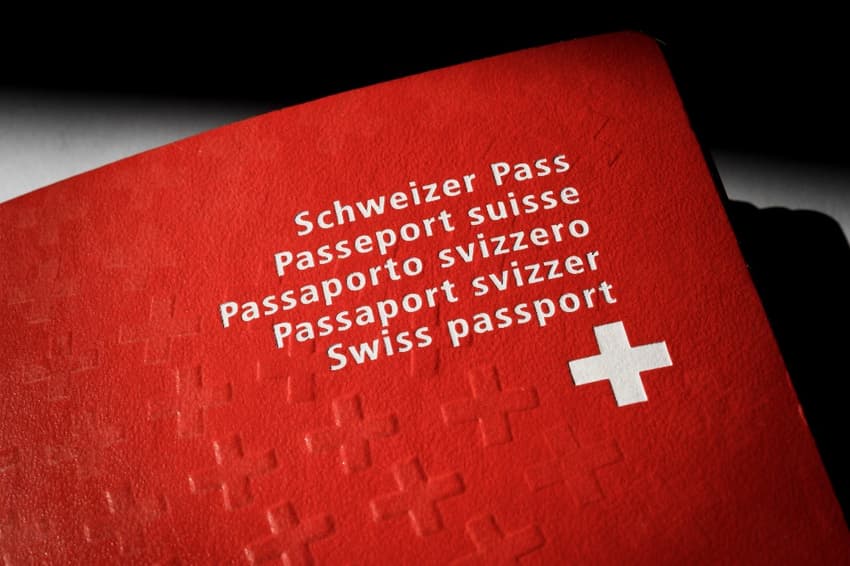Which foreign citizens want Swiss nationality the most — and why?

New study reveals who is most likely to apply for naturalisation in Switzerland. The findings are quite surprising.
According to research carried out jointly by the University of Geneva and the Federal Migration Commission, most requests for naturalisations have come from the so-called “third country” nationals – that is, people from outside the European Union.
The highest number of applications (10.3 percent) are filed by the Russians, followed by citizens of Iraq (6.1 percent), and India (4.12 percent).
READ ALSO: The Swiss cantons with the strictest citizenship requirements
Nearly 4 percent of U.S. nationals living in Switzerland have also applied for Swiss citizenship.
Why is an increasing number of third-country nationals trying to become Swiss?
“Traveling with a Swiss passport becomes much easier for those who are not part of the European community”, said one of the study’s authors, Philippe Wanner, who is a professor of demography at the University of Geneva.
“Secondly, naturalisation by people from cultures other than ours is a tool for greater integration and easier access to the European labour market”, he added.
READ MORE: How to apply for Swiss citizenship - An essential guide
Wanner also noted that citizens of non-EU countries often come to live in Switzerland permanently “because the political or economic situation in their home country is difficult. Applying for a Swiss passport is therefore a logical step”.
However, Barbara Steinemann, an MP representing the right-wing Swiss People’s Party, criticised the growing tendency of immigrants from outside the EU to apply for naturalisation.
“It is a problem if foreigners asking for naturalisation think only of their own personal gain, rather than a real desire for integration", she told the German-language 20 Minuten news portal.
But Pascale Steiner of the Federal Migration Commission pointed out that there are other reasons for wanting to obtain Swiss citizenship, such as the desire to vote and contribute to the decision-making processes.
Study author Wanner agreed with this assessment, remarking that naturalisation “is particularly interesting for people from non-democratic countries because, as Swiss citizens, they can have a say in public life”.
READ MORE: Would you pass a Swiss citizenship test?
Foreigners must live in Switzerland permanently for 10 years before applying for naturalisation, unless they are married to a Swiss national, in which case they can request naturalisation after five years of residency and three years of marriage.
Those who are on welfare or have a criminal record are excluded.
A quarter of Switzerland’s 8.5 million population is foreign, with Italians comprising the largest group at nearly 15 percent. They are followed by the Germans (14.3 percent) and the Portuguese (12.3 percent).
Comments
See Also
According to research carried out jointly by the University of Geneva and the Federal Migration Commission, most requests for naturalisations have come from the so-called “third country” nationals – that is, people from outside the European Union.
The highest number of applications (10.3 percent) are filed by the Russians, followed by citizens of Iraq (6.1 percent), and India (4.12 percent).
READ ALSO: The Swiss cantons with the strictest citizenship requirements
Nearly 4 percent of U.S. nationals living in Switzerland have also applied for Swiss citizenship.
Why is an increasing number of third-country nationals trying to become Swiss?
“Traveling with a Swiss passport becomes much easier for those who are not part of the European community”, said one of the study’s authors, Philippe Wanner, who is a professor of demography at the University of Geneva.
“Secondly, naturalisation by people from cultures other than ours is a tool for greater integration and easier access to the European labour market”, he added.
READ MORE: How to apply for Swiss citizenship - An essential guide
Wanner also noted that citizens of non-EU countries often come to live in Switzerland permanently “because the political or economic situation in their home country is difficult. Applying for a Swiss passport is therefore a logical step”.
However, Barbara Steinemann, an MP representing the right-wing Swiss People’s Party, criticised the growing tendency of immigrants from outside the EU to apply for naturalisation.
“It is a problem if foreigners asking for naturalisation think only of their own personal gain, rather than a real desire for integration", she told the German-language 20 Minuten news portal.
But Pascale Steiner of the Federal Migration Commission pointed out that there are other reasons for wanting to obtain Swiss citizenship, such as the desire to vote and contribute to the decision-making processes.
Study author Wanner agreed with this assessment, remarking that naturalisation “is particularly interesting for people from non-democratic countries because, as Swiss citizens, they can have a say in public life”.
READ MORE: Would you pass a Swiss citizenship test?
Foreigners must live in Switzerland permanently for 10 years before applying for naturalisation, unless they are married to a Swiss national, in which case they can request naturalisation after five years of residency and three years of marriage.
Those who are on welfare or have a criminal record are excluded.
A quarter of Switzerland’s 8.5 million population is foreign, with Italians comprising the largest group at nearly 15 percent. They are followed by the Germans (14.3 percent) and the Portuguese (12.3 percent).
Join the conversation in our comments section below. Share your own views and experience and if you have a question or suggestion for our journalists then email us at [email protected].
Please keep comments civil, constructive and on topic – and make sure to read our terms of use before getting involved.
Please log in here to leave a comment.